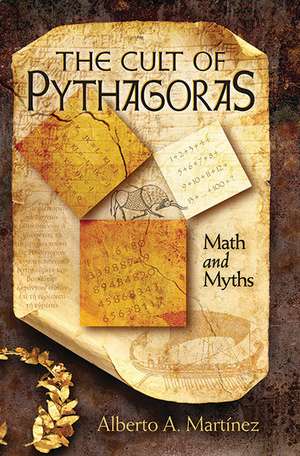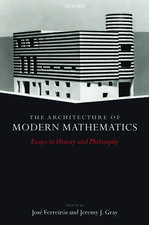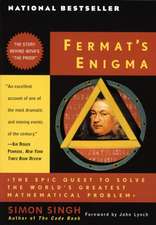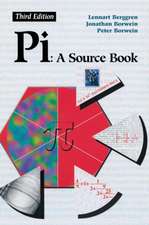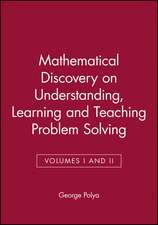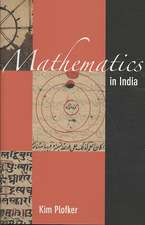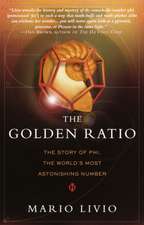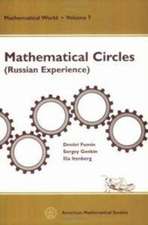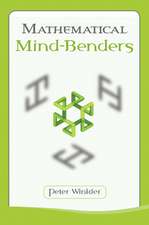The Cult of Pythagoras: Math and Myths
Autor Alberto A. Martinezen Limba Engleză Paperback – 26 iun 2013
In this follow-up to his popular Science Secrets, Alberto A. Martínez discusses various popular myths from the history of mathematics: that Pythagoras proved the hypotenuse theorem, that Archimedes figured out how to test the purity of a gold crown while he was in a bathtub, that the Golden Ratio is in nature and ancient architecture, that the young Galois created group theory the night before the pistol duel that killed him, and more. Some stories are partly true, others are entirely false, but all show the power of invention in history. Pythagoras emerges as a symbol of the urge to conjecture and “fill in the gaps” of history. He has been credited with fundamental discoveries in mathematics and the sciences, yet there is nearly no evidence that he really contributed anything to such fields at all. This book asks: how does history change when we subtract the many small exaggerations and interpolations that writers have added for over two thousand years?
The Cult of Pythagoras is also about invention in a positive sense. Most people view mathematical breakthroughs as “discoveries” rather than invention or creativity, believing that mathematics describes a realm of eternal ideas. But mathematicians have disagreed about what is possible and impossible, about what counts as a proof, and even about the results of certain operations. Was there ever invention in the history of concepts such as zero, negative numbers, imaginary numbers, quaternions, infinity, and infinitesimals?
Martínez inspects a wealth of primary sources, in several languages, over a span of many centuries. By exploring disagreements and ambiguities in the history of the elements of mathematics, The Cult of Pythagoras dispels myths that obscure the actual origins of mathematical concepts. Martínez argues that an accurate history that analyzes myths reveals neglected aspects of mathematics that can encourage creativity in students and mathematicians.
The Cult of Pythagoras is also about invention in a positive sense. Most people view mathematical breakthroughs as “discoveries” rather than invention or creativity, believing that mathematics describes a realm of eternal ideas. But mathematicians have disagreed about what is possible and impossible, about what counts as a proof, and even about the results of certain operations. Was there ever invention in the history of concepts such as zero, negative numbers, imaginary numbers, quaternions, infinity, and infinitesimals?
Martínez inspects a wealth of primary sources, in several languages, over a span of many centuries. By exploring disagreements and ambiguities in the history of the elements of mathematics, The Cult of Pythagoras dispels myths that obscure the actual origins of mathematical concepts. Martínez argues that an accurate history that analyzes myths reveals neglected aspects of mathematics that can encourage creativity in students and mathematicians.
Preț: 219.53 lei
Nou
Puncte Express: 329
Preț estimativ în valută:
42.01€ • 43.98$ • 34.76£
42.01€ • 43.98$ • 34.76£
Carte disponibilă
Livrare economică 15-29 martie
Preluare comenzi: 021 569.72.76
Specificații
ISBN-13: 9780822962700
ISBN-10: 0822962705
Pagini: 288
Ilustrații: 42 b & w Illustrations
Dimensiuni: 152 x 229 x 23 mm
Greutate: 0.46 kg
Ediția:1
Editura: University of Pittsburgh Press
Colecția University of Pittsburgh Press
ISBN-10: 0822962705
Pagini: 288
Ilustrații: 42 b & w Illustrations
Dimensiuni: 152 x 229 x 23 mm
Greutate: 0.46 kg
Ediția:1
Editura: University of Pittsburgh Press
Colecția University of Pittsburgh Press
Recenzii
“Martínez not only rigorously compares the exciting myths about Pythagoras with the sparse, and mostly contradictory, historical sources, he also explains why we have these myths and the purposes they serve. His book will be a natural first port of call for people who like to get this sort of thing right.“
—Jeremy Gray, The Open University
—Jeremy Gray, The Open University
“Mathematics is the last subject one would expect to be infested with mythology, but even mathematicians can fall for myths, particularly those concerning the history of their subject. In this delightful exposé, Alberto Martínez finally busts the many myths of math, and the results are both sobering and fascinating.”
—John C. Stillwell, University of San Francisco
—John C. Stillwell, University of San Francisco
“An engaging study.”
—Library Journal
—Library Journal
“Martinez explains concepts like ‘imaginary numbers’ and ‘velocity calculation’ in a manner that makes them easy for even a non-math person to understand. . . . Discussions of complex mathematical concepts are where Martinez shines. . . . An unexpectedly engaging book on a subject often considered very dry. While the book will certainly be of interest to students and scholars of math, Martinez has situated the subject in broader themes of human nature in a way that will appeal to a much wider audience.”
—Texas Books in Review
—Texas Books in Review
“Serves to set the record straight for two potential audiences. First, for those of us who consider ourselves knowledgeable about the history of mathematics, this book aims to shake us out of our naivety by forcing us to reexamine how we know what we know and how we should distinguish fact from the fiction that so often substitutes for a proper history of mathematics. Second for those who are not familiar with the history of mathematics, this book provides a compilation of historical examples that portrays mathematical knowledge as fluid, controversial, and ever evolving.”
—Mathematics Teacher
—Mathematics Teacher
"Mathematics teachers and lecturers and graduate students in mathematics would benefit from reading this book, as that would help them become more aware of the issues, uncertainties, and challenges surrounding knowledge about the history of mathematics, which at the outset may appear unproblematic to some. Increased awareness can then lead to reflection on, and possible re-thinking of, pedagogical practices related to the role of history in mathematics teaching and learning."
—Springer Science+Business Media
—Springer Science+Business Media
"An enjoyable read. Rather than simply discounting one-by-one the myths of many of us have heard, the author instead attempts to explain how each myth has taken such a long journey away from truth. Martínez describes this work as being 'about the evolution of myths in the history of mathematics.' But he has accomplished more than that. Not only does he determine HOW stories develop into myths, he also often succeeds in an attempt to explain WHY. At the very least, he encourages us to stop their spread, as 'hearsay and fictions contaminate education by masquerading as history."
—American Mathematical Monthly
—American Mathematical Monthly
"Serves as an excellent companion volume to most standard works on the history of mathematics. Instructors would do well to recommend that their students read this work in parallel with the principal text in their history courses. As such, it should be included in all academic libraries."
—Mathematical Reviews
—Mathematical Reviews
Notă biografică
Alberto A. Martínez is associate professor of history at the University of Texas at Austin. He is the author of Science Secrets: The Truth about Darwin’s Finches, Einstein’s Wife, and Other Myths, Kinematics: The Lost Origins of Einstein's Relativity, and Negative Math: How Mathematical Rules Can Be Positively Bent.
Descriere
Martínez discusses various popular myths from the history of mathematics. Some stories are partly true, others are entirely false, but all show the power of invention in history. Martínez inspects a wealth of primary sources, in several languages, over a span of many centuries. By exploring disagreements and ambiguities in the history of the elements of mathematics, The Cult of Pythagoras dispels myths that obscure the actual origins of mathematical concepts.
Chosen as a major selection by Scientific American Book Club (Library of Science®)
Chosen as a major selection by Scientific American Book Club (Library of Science®)
